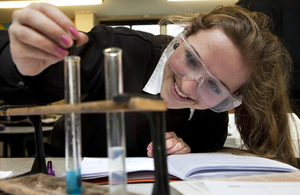Rising numbers of students turning to maths and science
Education Secretary Nicky Morgan has congratulated young people receiving their A level results today.

More students are taking A levels in the subjects that help secure the jobs with the highest wages and lowest chances of unemployment, according to results published today by the Joint Council for Qualifications (JCQ).
Since June 2010 entries in subjects like maths and the sciences have risen across the board:
- biology is up 10.7%
- chemistry up 21.5%
- physics up 18.5%
- maths up 15.3%
- further maths up 20.1%
Congratulating all students on their results, Education Secretary Nicky Morgan also welcomed the rising number of women getting top grades in maths and science.
Today’s results show that since 2010 more women are taking exams in science, technology, engineering and maths (STEM) subjects with A level entries rising in:
- maths: up by 10%
- physics: up by 16%
- chemistry: up by 23%
- biology: up by 16%
Encouraging more students to take maths and sciences post-16 is part of the government’s long-term economic plan. There is a strong demand across the economy for these skills, demonstrated by the fact that workers with maths A level earn on average 10% more than those that do not. In addition science or technological careers are paid on average 19% more than other professions.
Today’s results also show a long-term rise in the number of entries to ‘facilitating subjects’ such as maths, sciences, English, geography, history and foreign languages. These subjects are required more often than others by universities and help to give young people a greater choice of degree level courses
Since 2010 and the creation of the English Baccalaureate (EBacc) which encourages study of these subjects at GCSE, the number of students continuing to study facilitating subjects has risen by 5.1%. In the same period there has been an overall fall of 2.4% in ‘non-facilitating subjects’ such as media studies and general studies.
Education Secretary Nicky Morgan said:
I want all young people to leave school having had the best preparation for life in modern Britain. We are reforming exams to equip students with the skills to succeed in a modern workplace helping them and the country compete in a global economy.
That’s why I’m delighted to see more students, especially young women, studying maths and sciences and teachers having more time to push pupils to achieve the very top grades. This will help them secure the top jobs, regardless of their background, and secure a brighter future.
Today’s results are a testament to a bright, hard-working generation of teenagers and the dedication and commitment of teachers across the country. I congratulate them all.
The JCQ figures also show that the proportion of pass rates has remained relatively stable with a fall of just 0.1% year on year from 98.1% in 2013 to 98% in 2014.
DfE media enquiries
Central newsdesk - for journalists 020 7783 8300